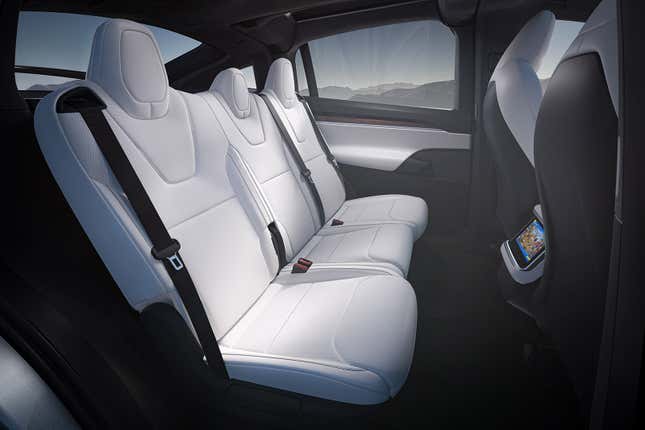When you hear the word “recall,” you probably think of massive campaigns involving scores of affected vehicles. Every once in a while though, just one lonely car out of hundreds of thousands are recalled. It happened to a Bentley Flying Spur with a poorly welded fuel tank in 2021, and it’s happened again to a much more ordinary vehicle — a Tesla Model X.
Last month, the National Highway Traffic Safety Administration published campaign 22V-264. The number of vehicles potentially involved? One. The estimated percentage of those cars with the relevant defect? 100. In this case, the defect pertained to the car’s safety in the event of a crash, as the document states that this particular Model X was “manufactured without a bracket that provides additional reinforcement to the body structure at the second-row seat.”
Without this necessary reinforcement, the crossover didn’t comply with seating system and belt anchorage requirements outlined in the Federal Motor Vehicle Safety Standards, and would have left occupants badly protected in an accident.

That’s a pretty glaring oversight, though it makes a little more sense considering the origin of this Model X. As it turns out, it was one of a limited number of 2022 pre-production units built in February with five seats. It had been “manufactured according to then-current design specifications without the body reinforcement bracket,” according to Tesla’s Chronology of Noncompliance Determination shared with the NHTSA.
Later compliance testing in March revealed the car would fail FMVSS without additional reinforcement, so Tesla updated the design specifications and retrofitted all examples in production with the new bracket. It earmarked the pre-production run to get the same treatment as well, yet this one managed to slip through the cracks due to what the automaker termed “an operational oversight,” and was received by the customer on March 31 anyway.
The bracket presumably couldn’t be bolted in at this point. After Tesla discovered the error in early April, per to the company’s own timeline, it arranged to replace this owner’s Model X with one that’s up to code. So ending another chapter in both head-scratching recalls and Tesla’s “Kia-in-the-’90s” build quality record. If nothing else, I’m just amused the NHTSA goes through the same bureaucratic rigamarole for one car as it does for 100,000.